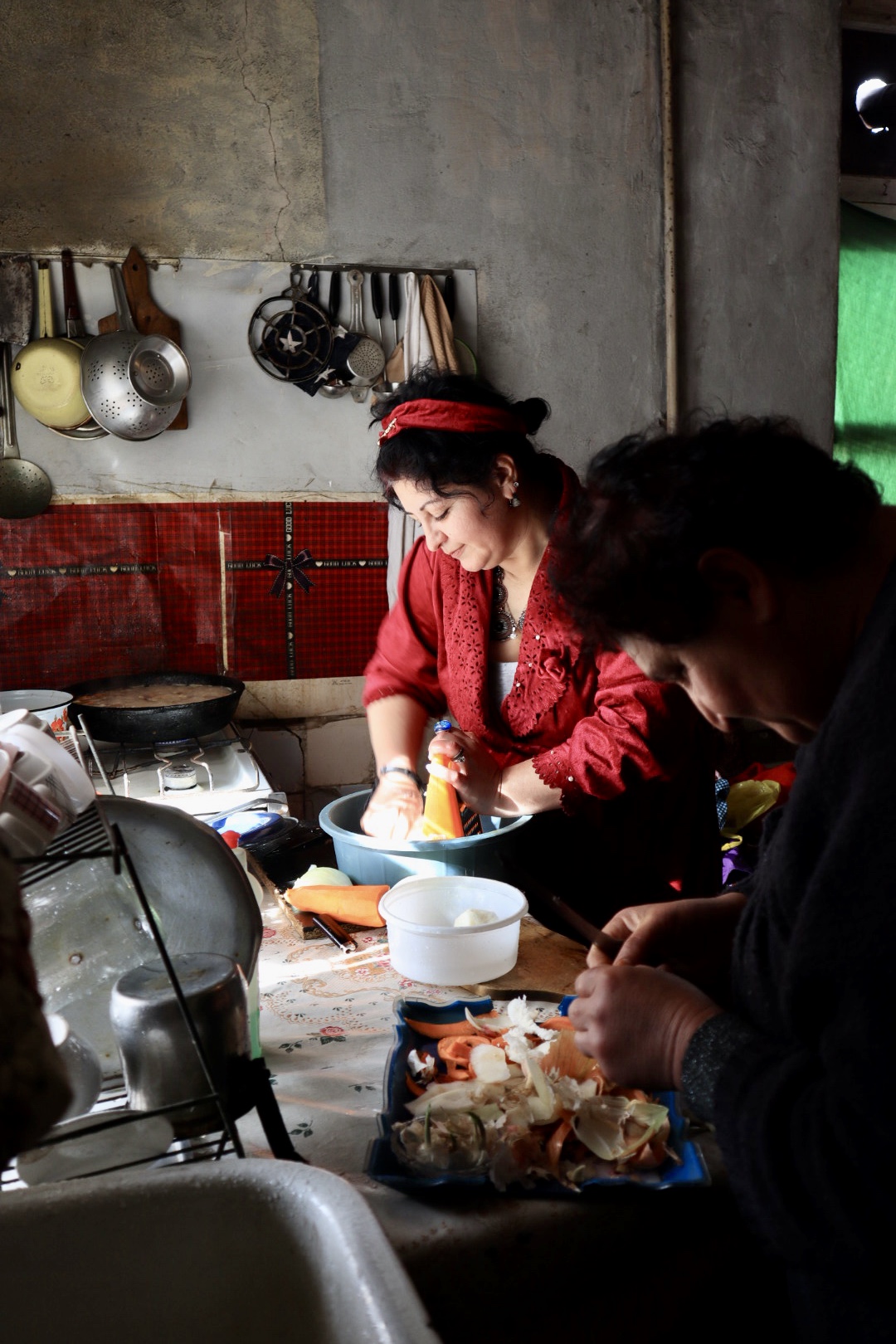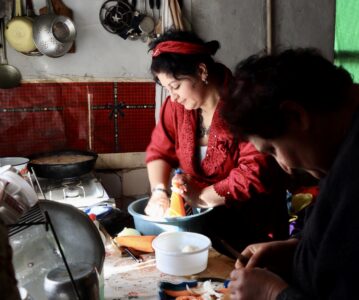Already in the afternoon we arrive in Goris. The city is located in a valley and is surrounded by high sandstone mountains.
Here we are again very close to the border with Azerbaijan or the Nagorno-Karabakh region, which we all know from the media. In 2020 the conflict over the area broke out here again and for some weeks there was an open war. After we have thawed out again from our downhill cold stupor in the afternoon sun, we relax and go in search of accommodation. The guesthouse, which we head for at random, exists only on our map but not in reality. We just want to start looking again, when suddenly a woman with pinned up hair and a light blue coat speaks to us cheerfully. She speaks Russian, we talk with hands and facial expressions and quickly it becomes clear: She offers us to come to her home. We have time and coffee always sounds tempting and so we soon push our heavy bikes back in the direction we just came from. The woman’s name is Rosa, she seems to have a very lively character and a good amount of energy and again and again we interrupt the march so she can speak long messages into the microphone of my cell phone. “I want to help people, we have to help each other,” she declares, beaming. We stole back, groaning under the weight of our bikes. We leave the center, cross a bridge, and push the bikes along a small path “This is my favorite way home!”, Rosa proudly proclaims. We turn off the road and Rosa picks the house keys out of her purse. “My house!” exclaims Rosa, pushing open a rusty gate. The fence to the left and right of the gate has seen better days. The only wall has completely crumbled and in its place chunks of concrete, wire and pieces of sheet metal have been piled up in a makeshift fashion. Of course, we are happy to be home with Rosa now, but it is hard to miss the fact that the house is quite a ramshackle shack. Reinforcing iron peeks cheekily out of the remaining concrete, doors hang uselessly askew on their hinges, and discarded kitchen appliances stand around. The toilet and shower are right next to the garage and seem very basic to say the least. We park the bikes and follow Rosa up the outside stairs to the upper floor. The staircase… Once a construction of metal and concrete now consists of large, broken out pieces of concrete, which have been placed makeshift on the metal beams. Where the concrete has completely crumbled, wobbly wooden boards cover the gaps. So we climb up into the very basic parlor/kitchen and are immediately seated on the bench. Rosa cheers “coffee, coffee” and puts the water on. The woman is very sympathetic to us and we are touched that she shows absolutely no shyness in inviting us into her poor house. We drink coffee and talk diligently via cell phone. Apparently two more people live here, Sarina and her son. Sarina is in poor health and Rosa supports her. Rosa whirls around, chats long messages into the translation app and tells us first details about her life. At some point, the slightly older Sarina trundles in. She doesn’t seem to mind our presence, but she also seems a bit overwhelmed with us two foreigners who don’t speak any useful language at all. She smiles shyly and mumbles to herself. We gladly accept the offer to take a shower and, refreshed, we explore the special rock formations right next to the town later in the afternoon. When we return to our unusual home in the evening, Rosa is still at work and Sarina kindly lets us in. We sit down on the small bench behind the rickety dining table and wait. The tube TV is on and squealing. On the Russian channel, images of the conflict in Ukraine trickle across the screen. Sporty super-soldiers with Go-Pros on their helmets wander through streets, yakking engagingly into the camera. Western politicians give speeches in a parliament and are covered with a big red “fake” sticker. Pictures of destroyed apartment blocks in Ukraine- with “fake” stickers. Pictures of Russian widows being presented with comforting bouquets of flowers by high-ranking military officials. Endless flood of images from the lives of the killed- new folk heroes.
Sarina gestures at the clock: Rosa will be late. She dozes off in her chair and we wait and wait and finally eat our remaining cookies. We should have discussed the dinner with Rosa better.
The next morning Rosa is back and the communication via cell phone flows in streams. Rosa wants to show us a church nearby and so we soon trudge with her through the area. Up to the cemetery – here she kisses one of the big gravestones with the pictures of the deceased. Her first husband, as we soon find out. On we go to a small viewing platform. Here we jubilantly admire the beauty of Gori. Next she drags us into a small grotto with countless images of Jesus, candle stubs and some chicken heads. Here we speak to God. Rosa prays for our further journey, blessing of children and all kinds of other things.
But the tour does not end there. In the following forty minutes we climb the observation tower of a hotel, “I used to work there”, visit a museum about an Armenian poet, squeeze into a shared cab and finally sit in the small snack bar where Rosa also works today. We drink a delicious rosehip juice and then set out to explore the city ourselves.
Our attempts to look for a hotel today were loudly rejected and so we trundle back to Rosa’s place as darkness falls. On the second morning – the day we were supposed to leave – Rosa is already in the kitchen, kneading and cooking the most delicious dumplings we can imagine. Today the table is richly set and we would be perfectly strengthened for a strenuous day of driving – but I feel rather wobbly on the legs and soon the program is completely changed: Simone sleeps well covered on the kitchen bench, Louie goes grocery shopping again for everyone, Rosa whirls around, Sarina is also somehow there and we stay another night. On this last evening Rosa and Sarina serve up another hearty meal and we almost feel part of this patchwork family. Saying goodbye the next morning is difficult and is accompanied by the advice not to let the Azerbaijanis shoot us in the conflict area.
We push our bikes out of the small courtyard onto the street, wave goodbye, and Rosa pours a bucket of water on the ground. “Our custom,” she types hastily into her cell phone. We throw ourselves into the fierce wind and wish Rosa and Sarina only the best.


